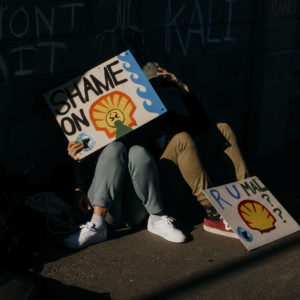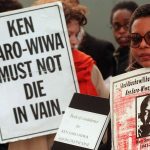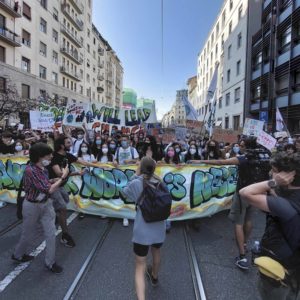Go to hell, Shell
The explosion of rage in South Africa in response to the multinational company exploring for oil and gas in the ocean off the Wild Coast is entirely justified.
Author:
26 November 2021

The corporate drive for profit frequently takes the form of a psychopathic monomania. But among the many horsemen of the corporate apocalypse, Royal Dutch Shell has a particular record of infamy.
Shell is responsible for more of the human-generated emissions that are accelerating the climate crisis than most countries. However, until recently, it was not, like states, required to abide by the Paris Accord. In May this year, a Dutch court changed that and compelled Shell to cut its emissions by 45% from 2019 levels by 2030, and ruled that Shell was a threat to the right to life.
Related article:
Shell has known since at least 1988 that its profit model was a direct threat to humanity, and on a planetary scale. In that year, when global heating was not an issue of general concern, Shell commissioned an internal research project into the planetary consequences of its carbon emissions. The research predicted a doubling of CO2 levels by 2030 and, as a result, a temperature rise of 2°C and a sea level rise of at least 1m. It noted that the temperature increase could lead to the disintegration of the West Antarctic Ice Sheet, resulting in a planetary rise in sea levels of 5m to 6m, which would entirely submerge low-lying countries.
Yet despite knowing this, Shell continued to poison the planet. In 2020, the company planned to increase oil and gas production by 38% by 2030.
Death in the delta
Shell is most notorious for its devastation of much of the Niger Delta, which is now one of the most polluted places on the planet. Shell has been drilling in the Delta, home of the Ogoni people, since 1958 and there is a long history of opposition to the devastation that the company has wreaked there. In 1970, Ogoni leaders charged Shell with “seriously threatening the wellbeing, and even the very lives” of their people. As dissent escalated, so did repression. In 1987, following a peaceful demonstration against Shell, an attack by the notorious Mobile Police force (Mopol), popularly known as “kill-and-go”, left 350 people homeless.
Matters came to a head in the 1990s after sustained mass protest was met with vicious repression. In 1990, Shell requested the presence of Mopol in response to a protest against the company. Around 80 unarmed demonstrators were murdered and 496 houses either destroyed or severely damaged.
In the same year, Writer Ken Saro-Wiwa led the formation of the Movement for the Survival of the Ogoni People (Mosop). Speaking in a television interview in the United Kingdom, he lamented: “The Ogoni country has been completely destroyed by the search for oil… Oil blowouts, spillages, oil slicks and general pollution accompany the search for oil… What used to be the breadbasket of the delta has now become totally infertile. All one sees and feels around is death. Environmental degradation has been a lethal weapon in the war against the indigenous Ogoni people.”
Related article:
Saro-Wiwa was jailed without trial for several months in 1992. In January the following year, Mosop mobilised around 300 000 people, said to be a quarter of the Ogoni population, in protest against Shell. The Nigerian state, which had degenerated into a military dictatorship under the control of Sani Abacha, responded with a military occupation of the region.
Saro-Wiwa was arrested on trumped-up charges in May 1994 and repeatedly subjected to torture as part of a broader campaign of repression led by the notorious Paul Okuntimo, then a lieutenant-colonel in the army. Okuntimo was reported as having said that “he was doing it all for Shell … But he was not happy because the last time he had asked Shell to pay his men their outstation allowances he had been refused, which was not the usual procedure.”
By June, Shell had been forced out of the Delta by a peaceful uprising, and its international reputation was in crisis after repeated allegations that it had colluded with the military in abuses of various kinds, including massacres. Saro-Wiwa and eight others were executed in November. There was global outrage. Activists in Europe firebombed fuel stations and in many countries, including South Africa, there were boycotts of Shell stations and demands for disinvestment in the company.
It initially denied complicity in the execution of the Ogoni Nine. But on the eve of a trial scheduled to take place in New York in 2009, Shell agreed to pay a settlement of $15.5 million in response to legal action. It was accused of having conspired with the Nigerian state to capture and hang the men, and collaborating with the army to capture, torture and kill other protesters. One of the plaintiffs was Karalolo Kogbara. She lost an arm in 1993 after she was shot during a protest against the bulldozing of her village to clear the way for a Shell pipeline. The company was also alleged to have supplied the Nigerian army with patrol boats, vehicles and ammunition, and to have co-planned military operations, including raids on villages.
Related article:
Shell’s conduct in Nigeria has continued to elicit deep concern. In 2010, a United States diplomatic cable made public by WikiLeaks showed that a top executive in Shell had told US diplomats the company had seconded employees to key government departments and knew “everything that was being done in those ministries”. The leaks also showed that Shell and the US state swapped intelligence, and that Shell shared a list of people it believed to be supporting the militants organising sabotage against the company in the Nigerian oilfields.
Successful legal action against Shell has also continued. In 2015, seeking to avoid a case being heard in the London high court, Shell agreed to pay £55 million to 1 600 people in Bodo, a village in Rivers State, in compensation for oil spills in 2008 and 2009 that devastated their community.
In January this year, a Dutch court ordered Shell to pay compensation, to be determined at a later date, to Nigerian farmers for oil spills in 2004 and 2005. In August, Shell agreed to pay the Ejama-Ebubu community in the Delta $111 million in compensation for a spill in 1970 that was said to have turned the rain black. Shell had first been ordered to pay compensation by a Nigerian court in 2010, but it spent years trying to appeal the ruling before it finally ran out of judicial road.
Despoiling the Arctic
In recent years, Shell has added to its global notoriety by drilling in the Arctic. It began looking for oil in the Arctic in the 1980s, but started a major project in 2008. There was immediate and widespread opposition and in 2010, after the massive oil spill in the Gulf of Mexico, Barack Obama’s government imposed a temporary moratorium on offshore drilling. Shell returned to drilling in mid-2012 but, after a series of mishaps, including an incident in which one of its ships almost ran aground, the company was barred from deep drilling. When it was able to return to drilling later in the year, a ship caught fire and a rig ran aground.
In 2015, after spending $7 billion, the company cancelled its Arctic drilling operations in the face of massive public pressure – including the forced shutdown of 53 fuel stations in London and Edinburgh by activists in 2012. Greenpeace said: “Big oil has sustained an unmitigated defeat. They had a budget of billions, we had a movement of millions. For three years we faced them down, and the people won.” But in 2020, Shell announced that it had applied to resume drilling in the Arctic in 2023.
Mendacity
Now that Shell has its eye on the Wild Coast, South Africans have every reason to be concerned and enraged.
Pam Ntaka, the company’s spin doctor, has said that Shell undertook “a full stakeholder consultation process” and would “take great care to prevent or minimise impacts on fish, marine mammals and other wildlife”.
But Shell is hardly an organisation with a record of public honesty. On the contrary, it has a record of mendacity. The company lied about the scale of its oil reserves in 2004 and had to pay a total of $150 million in fines to the US Securities and Exchange Commission and the Financial Services Authority in the UK. After a lawsuit, it had to pay a further $450 million to shareholders.
Related article:
Shell is also notorious for greenwashing. In 2008, the Advertising Standards Authority in the UK ruled that the company had misled the public in an advertisement when it falsely claimed that a $10 billion oil sands project in Canada was a “sustainable energy source”.
In Durban, well-respected and long-standing grassroots environmental activist Des D’Sa has called for a boycott of Shell and demanded that the company close shop and leave South Africa.
A boycott is an excellent idea.




